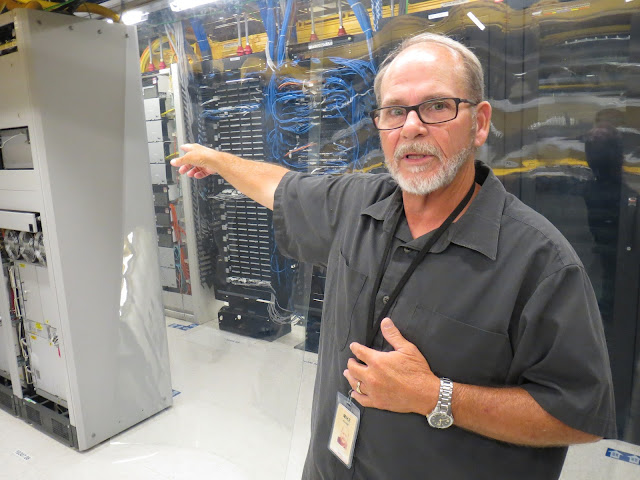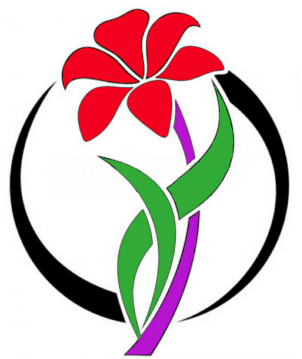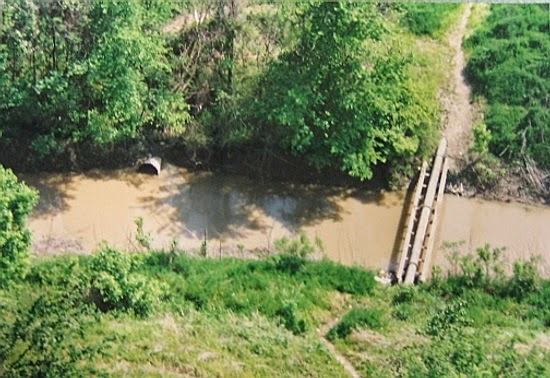Verizon, GEMA Form Disaster Response Partnership
How the public and private sector is working together in Georgia to ensure wireless communications remain steady in emergency situations.
 |
Verizon Wireless senior technician Mike House shows off the hardware housed at a suburban Atlanta switch facility. (Photo Credit: James Swift)
|
By: James Swift
uncommonjournalism@gmail.com@UNJournalism
In the northern suburbs of Atlanta, senior technician Mike House roams the almost blindingly white halls of the Verizon Wireless switch facility.
“This place is either like a hospital or a prison, and I can’t tell you which one,” he said. “It’s all square … you just keep going right and you will get there, eventually.”
Nestled deep in the Fulton County countryside, the regional network center is home to about 100 employees. It is one of two 4G LTE distribution locations Verizon has in the region, which covers a wide swath across Georgia and Alabama.
In the control room, House and his colleagues keep a close eye on an array of flat screen monitors, which measure disruptions in voice and data services. In addition to the 4G infrastructure, the center also houses Verizon’s legacy technology platforms, including its older 2G, 3G and code division multiple access, or CDMA, hardware.
“The yellow is kind of informational -- ‘hey, this is going on, and this is what’s happening,’” House said while pointing at a terminal evaluating site performances. “If you see a red line, that’s normally a cell site that has a serious issue.”
In many storage spaces, thick plastic sheets hang from the walls to keep hardware from overheating. The room temperature fluctuates wildly, dropping and rising 20 degrees over a span of just a few feet.
At all times, he said the building is operating off about 750 kilowatts. The site houses two power generators, which combined, hold about 18,000 gallons of fuel.
Using the larger of the two generators, he said, allows the facility to operate under a full load for close to two weeks.
“The corporate idea is to go n-plus-one,” he said, “so now, we’re good for at least 20, 21 days.”
Network Operations Director Jim Blake said similar safeguards are taken at the region’s cell sites. All of them, he said, have battery back-ups, with 91 percent also having generator back-ups.
“Every week, we run every generator in our network under load and we monitor the performance,” he said, “so if there is an issue we can immediately deal with it so when it is needed, we know it is going to operate.”
At any one of the seven switch facilities in the region, Blake said every part of the network can be monitored. That ability to maintain reliable wireless services is especially important, he said, as hurricane season draws near.
“Communication is key, obviously not only for the customers,” he said, “but for the folks in the emergency operations centers.”
A Year-Round Effort
“We have a lot of disaster recovery assets at our disposal,“ said Lynn Carlson, executive director of network operations for the Georgia and Alabama region. Those emergency response tools, he said, include portable wireless communication centers and a fleet of portable back-up generators.
The company’s disaster recovery efforts, he said, sometimes begin weeks ahead of storms.
“What we’ll do is assign certain tasks to individuals in our organization -- for instance, somebody would be responsible for portable generator deployment, somebody would be responsible for fueling and somebody would be responsible for working with the telephone companies or Ethernet backhaul providers,” he said. “We will have regular meetings for conference calls and we will set up a control center in one of our switching locations, which would typically be covering the area that may be impacted.”
Call volumes spike when disasters like hurricanes and tornadoes occur, Carlson said. To prepare for the surge in wireless communications usage, he said Verizon will add more capacity along predetermined evacuation routes.
To keep individual switch facilities from being overtaxed, he said employees at other regional sites can remotely perform the same functions. That’s precisely what the north Fulton site did earlier this year, he said, when back-to-back ice and lighting storms hit the area.
“There’s nothing special we do around hurricane season, because we do this all-year-round for all different types of disasters,” Blake said. “We’ve dealt with wildfires, flooding and tornadoes … it’s all about preparedness, being ready in advance of the event so that you are not in panic mode.”
The network team, he said, coordinates semi-annual emergency drills. “In addition to that, we work with the non-network departments, the sales teams and other groups,” he said, “and make sure things run smoothly there.”
Verizon has also made physical upgrades to safeguard sites against severe weather. Over the last two years, Blake said the company has engaged in “coastal hardening efforts” in southern Georgia --particularly the Chatham County area -- where wireless facilities have been revamped to stand atop 18-foot platforms.
“We basically modeled a Category 3 hurricane coming into the coast of Georgia and identified where all our sites were,” he said. “We made some substantial investment in taking our sites that were within 25 miles of the coast and hardening, or building them up, so they wouldn’t be susceptible to the flooding.”
The company is not just focusing on tornadoes and hurricanes, however. Carlson said Verizon also makes emergency plans for a whole host of man-made disasters.
“We prepare for those things pretty similarly to what we do for a [natural] disaster, where you’re going to have an increase in call volume,” he said. “We recently participated in a drill, or a tabletop exercise, for a terrorist-type event, or an event happening at someone’s office where you’ve got someone coming in, a shooter onsite.”
A Private-Public Partnership for Safety
Lisa Janak-Newman, a public information officer for the Georgia Emergency Management Agency, said communications companies play a critical role in the state’s disaster recovery efforts.
“Eighty percent of our country’s infrastructure is owned by private companies," she said, "so it's important that we stay connected to companies like Verizon."
She said Verizon was one of several companies GEMA worked with when a winter storm struck the metro-Atlanta area in late February. She explained how the agency interacts with private entities during such emergencies.
“We would have a representative in our state operation center make us aware of any issues they have with our network, so we can in turn help them get to go where they need to be,” she said. “So if there are any trees down or the roads are flooded, we will be able to help them get into that area and resolve their issues as quickly as possible.”
A few weeks ago, she said GEMA held a hurricane response exercise with several private sector partners.
“There could be all sorts of hazards as a result of hurricanes,” she said. “It can bring high winds, it can knock down trees and power lines … a tropical storm could hover over an area and drop a lot of rain and cause severe flooding.”
Even those living outside the state’s coastal areas, she said, are at-risk from the residual effects of hurricanes. She said storm systems spawned in the wake of Hurricane Katrina in 2005, for example, led to an outbreak of more than a dozen tornadoes in Georgia.
Developing a Communications Strategy for Emergencies
While many families think they are adequately prepared for disasters, Janak-Newman said they often realize they are not ready when emergency situations actually arise.
“Everybody thinks their family will be together when disaster strikes, but your kids could be at school and your spouse could be at work,” she said, “so it’s important that you talk to your family and find out how you’re going to communicate.”
A valuable tool, she said, is the online resource Ready Georgia. There, she said residents can fill out a personal profile, which calculates all of the supplies a household may need to make it without electricity for several days.
Families, she said, should make sure they have emergency charging options for their phones, such as a car-charger or a power supply brick. “When the power goes out, it’s important to make sure you have a way to get information and you stay connected,” she said.
Additionally, she said Georgia residents would be wise to maintain a written list of emergency contacts, with their numbers programmed into their mobile devices.
During emergency situations, she advised families to text instead of making calls, since text messages use less bandwidth than voice data. Furthermore, she said social media sites are excellent ways for individuals to let friends and family know they are OK in the aftermath of a disaster.
Lastly, she said families should pinpoint at least one relative or friend who lives out of state as an emergency contact. “It may be easier to call out of state than across town in an emergency,” she said, “so everybody should know who this person is and how to contact them.”
Whether winter, spring, summer or fall, she said families need to take preventative measures to keep themselves safe -- and able to communicate -- when severe weather strikes.
“No matter what the seasonal forecast says,” she said, “all it takes is one storm to devastate a community.”
Additionally, she said Georgia residents would be wise to maintain a written list of emergency contacts, with their numbers programmed into their mobile devices.
During emergency situations, she advised families to text instead of making calls, since text messages use less bandwidth than voice data. Furthermore, she said social media sites are excellent ways for individuals to let friends and family know they are OK in the aftermath of a disaster.
Lastly, she said families should pinpoint at least one relative or friend who lives out of state as an emergency contact. “It may be easier to call out of state than across town in an emergency,” she said, “so everybody should know who this person is and how to contact them.”
Whether winter, spring, summer or fall, she said families need to take preventative measures to keep themselves safe -- and able to communicate -- when severe weather strikes.
“No matter what the seasonal forecast says,” she said, “all it takes is one storm to devastate a community.”
Uncommon Journalism, 2015.



Comments
Post a Comment